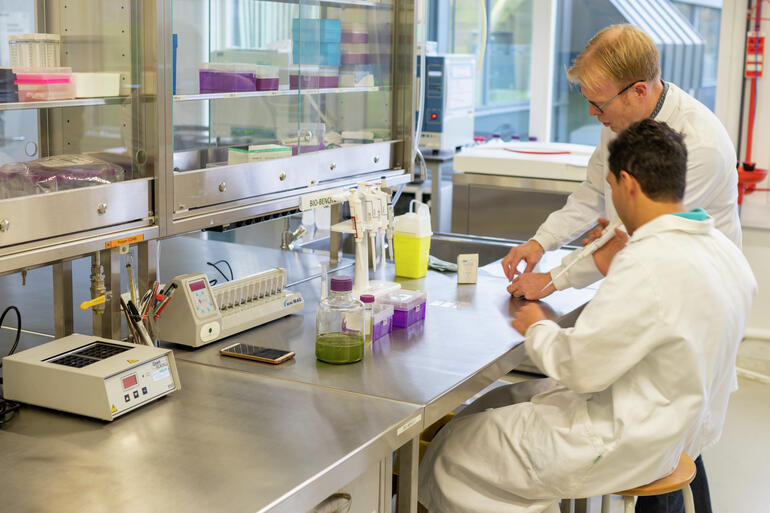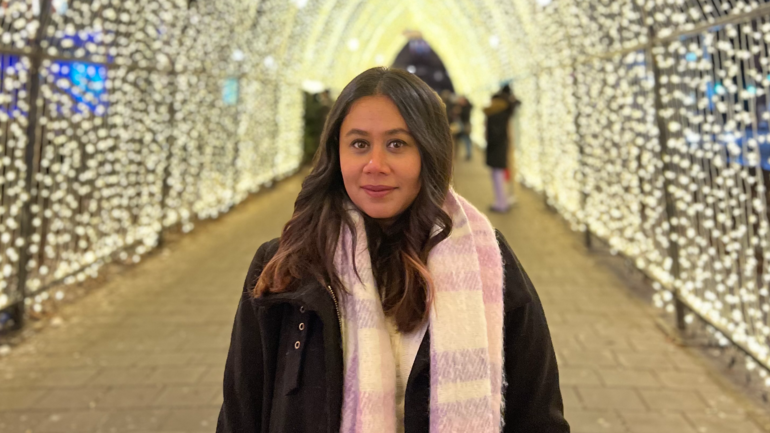Master of Science – Micro and Nano Systems Technology
Vestfold - Full time
The most spectacular technology is happening at the micro and nano level and you can become an expert of this state of the art technology.
-
Closing dates: Expired
Study facts
-
Campus: Vestfold -
Study level: Master's degree -
Progression of study: Full time -
Start up: Autumn 2024 -
Teaching model: On Campus -
Credits: 120 -
Closing dates: Expired -
Application code: Non-EU 7130 and EU/EEA 7133 -
Semesters: 4 -
Teaching Language: English

Sivilingeniør
This master program entitles you to use the protected title “Sivilingeniør”»
Why study Micro- and Nano Systems Technology?
Micro and nanotechnology can be found within near all fields; electronics, medicine, aerospace and petroleum are some examples. For this reason, the study is interdisciplinary and contains elements from both electronics, mechanics, physics, chemistry, mathematics, modelling and processing. You will learn how smart miniature components are designed, manufactured and characterized and how they play together in a complete system.
The programme is unique, exciting and practically oriented and is an excellent offer for those who already have a bachelor's degree in engineering or science. It will be a door opener to exciting jobs in a variety of industries.
The program is offered by the Department of Micro and Nanosystem Technology, which is one of the cornerstones of the national effort in micro and nanotechnology (NorFab). Located in Vestfold, between Horten and Tønsberg, you will find state-of-the-art laboratories and cleanroom facilities at your disposal. The collaboration with business life in the region is solid, and several micro- and nanotechnology companies have established themselves close to campus in recent years.
Every spring, all students present their master's projects at the student fair USNexpo.

"I cannot praise our faculty enough for their dedication and expertise. The professors and researchers in the Micro and Nano System Technology department were not only highly knowledgeable but also incredibly approachable and supportive"
Tasfia Nowshin Farook Eshita
Read the full recommendation
I am thrilled to share my testimonial after graduating from the esteemed program in Micro and Nano Systems Technology. My journey in this field has been nothing short of extraordinary, thanks to the exceptional facilities and supportive faculty provided by our university.
One aspect that truly sets our university apart is its state-of-the-art lab facilities. The university has invested heavily in equipping the labs with cutting-edge instruments and tools, allowing us to delve into the depths of micro and nano technologies. The labs were not only well-maintained but also well-stocked with the latest equipment, providing us with a hands-on experience that was invaluable in our research endeavors. The availability of these facilities empowered us to explore our ideas and contribute to the field in a meaningful way.
Additionally, I cannot praise our faculty enough for their dedication and expertise. The professors and researchers in the Micro and Nano System Technology department were not only highly knowledgeable but also incredibly approachable and supportive. They actively engaged with students, encouraging us to pursue our research interests and providing guidance every step of the way. Their mentorship played a pivotal role in shaping our research skills and fostering a passion for innovation.
To the upcoming students, I want to offer a word of encouragement. The field of Micro and Nano System Technology is a vast and exciting realm, brimming with endless possibilities. Embrace every opportunity to learn, collaborate, and experiment. The university will provide you with the resources and guidance you need, but it is your enthusiasm, curiosity, and perseverance that will drive you to success.
So, step into this program with an open mind, ready to challenge yourself and explore the frontiers of technology. Your journey will be filled with discoveries, accomplishments, and personal growth. Trust in your abilities, believe in your ideas, and make the most of the exceptional opportunities that await you.
Wishing you an incredible and fulfilling journey in Micro and Nano Systems Technology!
Tasfia Nowshin Farook Eshita
Semester exchange to USN
Within this programme there are several exchange opportunities for students from partner universities. Please contact our programme coordinator for details and course lists. Application deadline is May 1st for autumn semester and November 1st for spring semester for exchange.
Where can I work?
After graduating in micro- and nano system technology you will be able to work within micro- and nanotechnology in industry, academia and in research institutions.
Within companies that develop and produce microelectronic and micro- and nano systems, you can work in product development, manufacturing technology, production management, quality management and project management.
In businesses using micro- and nanotechnology, you can work with business development, marketing and sales, project management, research and development and technical consultation.
Working with the local business community
During the study there is several visits to electronics and microtechnology companies in the Horten area and experts from the industry are invited guest lecturers on selected topics.
We have a close collaboration with companies and research institutions both regionally, nationally and internationally. The programme is taught by experts in the field who are doing research on internationally level and master's theses are often linked to a research project or done in collaboration with a company. Good connections to and opportunities for networking with industry mean that several of the students are offered part-time jobs during their studies.
What you will learn
Our Masters Degree in Micro and Nano Systems Technology will open doors to exciting jobs in a multitude of industries. Micro- and nanotechnology can be found within almost all fields; electronics, medical, aerospace and petroleum are some examples. The programme is interdisciplinary and includes elements from electronics, mechanics, physics, chemistry, mathematics, modelling and processing. You will learn how micro- and nano systems are designed, produced and characterized.
Further studies
Graduates from the programme with average grade B or better are well qualified for further doctoral degree studies (PhD) at USN and other universities elsewhere in the world.
Get international experience
You can take parts of your study as an exchange student abroad. Studying or taking an internship abroad can give you the opportunity to expand your international competence, language skills, personal qualities and adaptability. It can also make you more attractive in the job market. We have agreements with foreign universities, colleges and internships adapted to your studies.
Study Plan
A study plan describes the content, structure and organization of a study programme. To each study plan there is a set of subject plans that describe the different subjects. In the subject plan you will also find a reading list. Below you will find a study model that shows you which subjects that are taught each term. In the study model you'll also find links to each subject plan.
Study plan for 2024 autumn
Admission requirements
This programme requires a completed and passed Bachelor's degree in engineering in line with the National Curriculum Regulations for Engineering Education in Norway in micro- and nanosystems technology, electronics, electro automation, mechatronics, mechanical, chemical, bioengineering or materials science. Closely related areas of engineering may also be accepted, provided that the programme contains minimum 120 ECTS specifically relevant for the program.
For all applicants, the following is also required:
- At least 25 ECTS in Mathematics
- At least 5 ECTS in Statistics
- At least 7,5 ECTS in Physics
- At least 5 ECTS in Electrical Circuits
- You must also fulfil the English requirements
Please read all the information about the admission process before you apply.
Export control
This programme may be covered by the regulations on export control. Export controls are applied to countries where there is suspicion about development and use of weapons of mass destruction. USN may therefore decide to conduct a specific evaluation of these applicants. As it is under discussion, we do not have more information at present.


